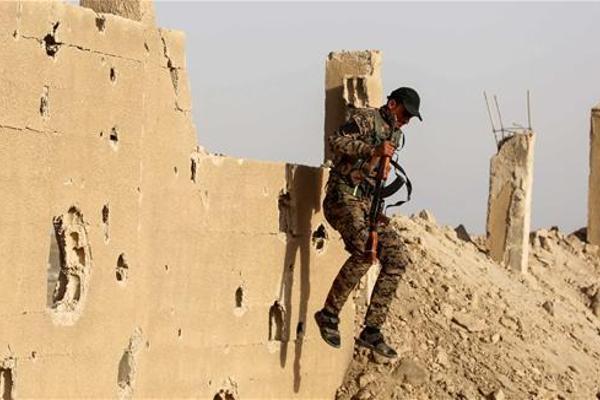US: Relations with YPG temporary, transactional, tactical
Cansu Çamlıbel - WASHINGTON


“We have not promised the YPG anything. They are in this fight because they want to be in this fight,” Jonathan Cohen, the deputy assistant secretary for European and Eurasian Affairs covering Greek Cyprus, Greece and Turkey, said at a panel at Washington’s Middle East Institute on May 17.
“Clearly they have their own motivations as well. We are in this common [fight] to defeat a terrorist organization in Iraq and Syria. Our relationship is temporary, transactional and tactical,” the State Department official said at the panel on Turkish-U.S. ties.
The panel came one day after Turkish President Recep Tayyip Erdoğan’s meeting with U.S. President Donald Trump in the city.
“We have the YPG because they were the only force on the ground ready to act in the short term. That is where it stops,” Cohen said.
The U.S. is cooperating with the YPG on the field but Turkey says this should end due to the group’s links to the outlawed Kurdistan Workers’ Party (PKK).
“I don’t think anything that we do with the YPG has anything to do with Turkey’s Kurds. You can’t solve the PKK issue by eliminating the YPG in Syria,” the diplomat said.
“We would like the PKK absolutely out of Sinjar but they don’t really control Sinjar. They have a presence there,” he said on the PKK’s activities in the Yazidi area in Iraq.
The U.S. has provided assurances that weapons to be provided to the YPG will only be used to liberate Raqqa from jihadists and not against Turkey, according to Ankara.
“[The Americans] told us that they won’t allow any group, including the YPG, to pose a threat to Turkey,” Foreign Minister Mevlüt Çavuşoğlu told NTV in an interview on May 18 regarding the details of a meeting between Erdoğan and Trump.
Washington sought to diffuse Ankara’s concerns by giving some assurances during the meeting.
Çavuşoğlu said Erdoğan informed Trump that Turkey would implement its rules of engagement against the YPG in the event of an assault, noting that U.S. officials did not raise any objections.
“Weapons will only be used in Raqqa and in the south. They won’t allow these weapons to be used against Turkey. And they will actively support Turkey’s fight against the PKK,” Çavuşoğlu said.
Turkey’s top diplomat said they had made it clear to U.S. officials that the YPG’s main objective was to expand its influence and territories in Syria for a future independent state on the pretext of fighting ISIL.
“They told us that they have not given any promises like this to the YPG,” Çavuşoğlu said.
“They also told us that they support the territorial integrity of Syria and wouldn’t allow such an entity,” he said.
U.S. officials told the Turkish delegation that the control and administration of Raqqa, a predominantly Arab city, would be left to Arab powers in line with Ankara’s demand.
Çavuşoğlu also compared Trump to former U.S. President Barack Obama, whose last two years in power featured significant rows with Turkey.
“Trump’s administration is different from Obama’s. We observed that the YPG did not withdraw from Manbij in spite of Obama and his military men. We are observing that the new administration is more sincere,” he said.
But Çavuşoğlu also accused those of implementing policies in the field of links with the previous administration.
